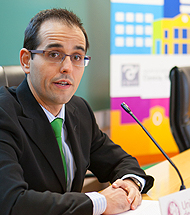"Libertarianism in the face of the subject 'Libet' experiments", topic central of the September seminar of the CRYF.
José Manuel Muñoz, PhD in Philosophy by the UNED, was the guest speaker to give the session.

"Libertarianism in the face of the subject 'Libet' experiments" was the central topic of the September seminar organized by the group Science, Reason and Faith (CRYF) of the University of Navarra. Professor José Manuel Muñoz, PhD from the Universidad Nacional de Education a Distancia (UNED), graduate in Biology from the University of Valencia and diploma holder in Religious Sciences from the Universidad San Dámaso, participated in the event.
Prof. Muñoz, who last year also participated in a seminar of the group Mind-brain at Institute for Culture and SocietyBefore starting, he put the attendees in context by explaining that the experiments deal with the electrophysiology of the temporal sequence of certain voluntary acts. In addition, he said that "when we talk about Libet's experiments, we are referring to very famous experiments that are more than 30 years old, while the 'subject Libet' experiments encompass those that have tried to emulate and improve on the original ones since then".
In his exhibition, Muñoz emphasized that "on numerous occasions, these experiments have led to a heated discussion both in Philosophy and in Neuroscience because some authors have seen in them an indication against the existence of free actions in human beings". Muñoz, however, pointed out the shortcomings of such interpretations.
During the session, the speaker developed the essential features of this subject of experiments and showed the position of prominent authors, in favor or against the argument of free will used in these experiments. In addition, he raised the question of whether or not, in the light of all that has been seen, the thesis known as libertarianism, defended by certain philosophers, according to whom the world is indeterminate and this allows us to enjoy free will, should be rejected.




